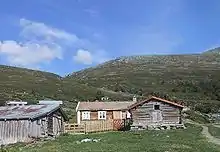saeter
See also: sæter
English
WOTD – 4 April 2021
Etymology
Borrowed from:
- Norwegian Nynorsk sæter (obsolete spelling), seter, and Norwegian Bokmål seter, from Old Norse sætr, setr (“dairy lands, mountain pastures; residence, seat; setting (of the sun)”); and
- Swedish säter (“mountain pastures”);
all from Proto-Germanic *sitjaną (“to sit”), ultimately from Proto-Indo-European *sed- (“to sit”).[1] The English word is a doublet of sit.
Pronunciation
- (Received Pronunciation) IPA(key): /ˈseɪtə/, /ˈsɛ-/
Audio (Southern England) (file) - (General American) IPA(key): /ˈseɪtɚ/, /ˈsɛ-/, [-ɾɚ]
- Homophones: satyr (GA pronunciation), setter (one pronunciation)
- Rhymes: -eɪtə(ɹ), -ɛtə(ɹ)
- Hyphenation: sae‧ter
Noun
saeter (plural saeters)
Translations
barn, etc., located in such a meadow
|
meadow, especially one used for grazing attached to a dwelling
See also
References
- Compare “saeter, n.”, in OED Online
 , Oxford, Oxfordshire: Oxford University Press, December 2020; “saeter, n.”, in Lexico, Dictionary.com; Oxford University Press, 2019–2022.
, Oxford, Oxfordshire: Oxford University Press, December 2020; “saeter, n.”, in Lexico, Dictionary.com; Oxford University Press, 2019–2022.
Further reading
 transhumance on Wikipedia.Wikipedia
transhumance on Wikipedia.Wikipedia
This article is issued from Wiktionary. The text is licensed under Creative Commons - Attribution - Sharealike. Additional terms may apply for the media files.
